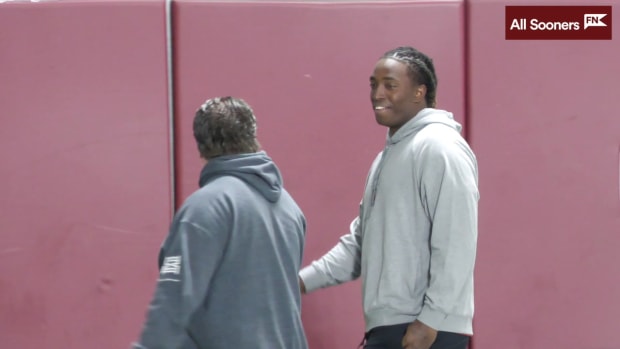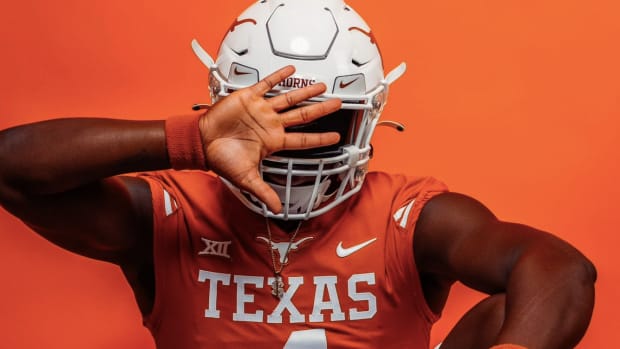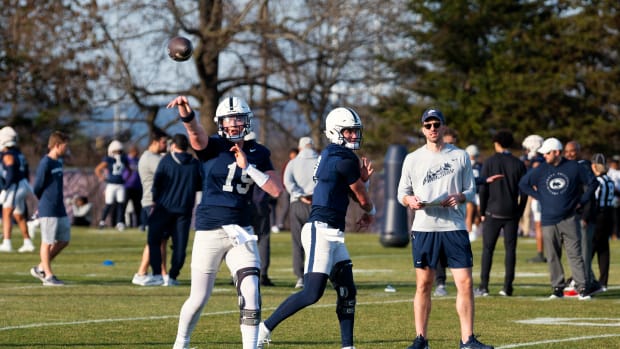Mississippi's Flag, the NCAA and the Battle for Change in Jackson
When the state of Mississippi last asked its voters to determine the future of its controversial state flag, Trey Lamar was but a 21-year-old walk-on running back at Ole Miss. Despite his busy fall schedule as a college football player, Lamar traveled to his local polling precinct to weigh in on a topic he felt passionately about. When he got there, he voted to keep a flag that prominently features the Confederate battle emblem.
Nearly two decades later, now a grizzled representative in the Mississippi Legislature, Lamar feels much differently about that flag. “God shows you things,” says Lamar, a white Republican from North Mississippi. “If half the people in the state want to get rid of it, a flag doesn’t do its job.”
Lamar has held such feelings for years, but now many more are joining his line of thinking following an unprecedented NCAA announcement last week. The governing body of college athletics is banning Mississippi colleges from hosting postseason events until the state erases the Confederate imagery from its flag. The organization may have supplied enough ammunition to convince flag supporters to finally buckle to what many feel is the inevitable—a changing of the flag.
“The NCAA doing this has advanced the ball,” says State Sen. Brice Wiggins, a Republican from Pascagoula.
In the final crucial week of their legislative session, amid a global pandemic no less, Mississippi lawmakers find themselves at the intersection of sports and politics—two volatile entities converging in arguably the most racially tense region of the United States. These are extraordinary circumstances: An athletic governing body from outside the state’s borders is pushing a policy change under threat of penalty. The nudge from the NCAA has triggered deep reflections in the state, reinvigorated a debate inside the Mississippi’s State Capitol that has drawn in prominent businesses and religious groups and set off a new flurry of attacks from both sides.
Mississippi’s situation is unique: It is the last remaining U.S. state to feature the Confederate cross on such a celebrated symbol, while also holding the country’s largest Black population (39%). According to the Associated Press, white supremacists in the Mississippi Legislature embedded the Confederate symbol in the upper left corner of the flag in 1894 as retaliation against political power that Black people gained during Reconstruction.
More than 125 years later, a deep divide exists on the issue—split largely along racial and political lines. Some lawmakers want a new flag, others want to keep the old flag and another group wants the people to decide through a ballot measure (which voters rejected in 2001).
Since the NCAA’s announcement, lawmakers have cycled through proposals to no avail, including an option to adopt a new flag while also keeping the old one. The two-flag proposal died quickly. One of its detractors, in fact, was the NCAA itself. “It wouldn’t satisfy them,” a high-ranking lawmaker in the state’s legislature told Sports Illustrated.
The battle, meanwhile, rages on. As of Tuesday evening, after two lengthy days of closed-door meetings, lawmakers in support of a new flag continued their attempt to convince opponents to switch sides. Their latest push Tuesday included religious leaders. On Wednesday, education leaders are expected to join the fight. Presidents and chancellors from the state’s four-year universities are scheduled to meet with lawmakers in Jackson. In another sports-centric plea, coaches of the state’s most prominent college teams may do the same later this week.
In basketball terms, it’s a full-court press. In football, it’s a full-house blitz. Its success remains a point of uncertainty among even the most high profile and informed legislators. But optimism grows. “The NCAA’s announcement made this a higher priority. People are waking up and realizing that there is real consequence here,” says Phillip Gunn, Mississippi’s House Speaker and a longtime advocate for changing the flag. “Many people don’t care what the NCAA thinks, but it’s not just about sports. It’s about business. It’s not just about playing a game—it’s about economics and image.”
Since 2001, Mississippi has been banned from hosting predetermined NCAA postseason events, such as men’s basketball tournament regionals or golf tournaments, but it was allowed to host other NCAA postseason championships, most notably baseball and softball regionals and the first/second round of the women’s basketball tournament. The NCAA expanded the postseason ban on Friday to include all events, penalizing any team whose state portrays the Confederate battle symbol on its Capitol grounds. Mississippi is the only state in the nation to fall under the restriction.
The NCAA ban applies despite the decision years ago by some of the state’s largest universities not to fly the state flag on campus, including Mississippi State, Ole Miss and Southern Miss, along with at least 11 other schools. In fact, Mississippi’s flag has been quite ostracized by many in the state. According to a compilation from Mississippi Today, a whopping 27 cities, six counties and over 125 businesses do not to fly the flag.
On Tuesday, leaders from all 15 of Mississippi’s community colleges joined the club, along with several religious groups, including the Mississippi Baptist Convention, a powerful organization with over 500,000 members in the state. And then came the doozy: Walmart added itself to that list. “It begs the question: Why have a flag that so many refuse to fly?” asks Rick Cleveland, a longtime sports columnist in the state who now works for Mississippi Today.
While the legislative process behind the flag’s existence is complicated, the impact of its presence is now quite simple: It will hurt. The NCAA’s decision has wide-ranging ramifications on the economies of Mississippi’s college towns and potentially devastating impacts on its university athletic programs. Mississippi State and Ole Miss have combined to host nine baseball regionals or super regionals since 2016, money-making events not just for the universities but their cities.
Ole Miss grossed about $200,000 in each of its last two home regionals, says Rebels athletic director Keith Carter. The impact in the Oxford and Starkville communities is more, netting the towns at least $3 million for a single regional weekend, according to economic experts in each town. “With any luck, sports might be the final straw that breaks the Confederate camel’s back,” says Lynn Spruill, the mayor of Starkville. “We’re dealing with the flag and COVID. One of them is a hell of a lot easier to get rid of than the other. Our legislature can do it with one vote.”
The economic impact goes well beyond baseball regionals. Mississippi State has hosted a four-team women’s basketball first/second round tournament the last three seasons, and NCAA tournament volleyball and soccer matches would fall under this ban, too. The Southeastern Conference and Conference-USA, of which Southern Miss belongs, announced their own bans of postseason events in the state. The C-USA baseball tournament, played in Biloxi the past three years, brings in about $4 million to the city, according to The Sun Herald.
The effects run deeper than the dollar. Mississippi State star running back Kylin Hill tweeted Monday that he won’t play for the Bulldogs if the flag isn’t changed. At least one other State player has joined him in the boycott, and former MSU linebacker Willie Gay encouraged more to do so in a message he posted on Twitter. Both State athletic director John Cohen and football coach Mike Leach say they support Hill.
Many believe more players, including those from Ole Miss, will follow suit. “Are more dominoes going to fall? Will other players do this?” asks Gunn. “You know this has to impact recruiting. I talked to two Mississippi football players last week from Texas, and during their recruiting, the Texas schools used that: ‘Don’t go over there because of the flag.’ That’s going to just increase.”
While lawmakers agree that the NCAA’s decision has expedited discussion, it has also pushed some away. Mississippians do not take kindly to demands from outsiders, says Jeremy England, a Republican senator from Ocean Springs. “We’re going to stand on a hill and shake our fist at the rest of the world,” he says, describing, not his, but others’ reactions. England’s constituents are concerned over a slippery slope. After the flag, what’s next? “Are we going to be pressured to change county names or take down monuments?” he says.
Chris McDaniel, a Republican senator from Ellisville, is one of the most outspoken supporters of the current flag. He says that any negative ramifications on Mississippi’s universities should be blamed on the governing body that enacted the ban, the NCAA. For its decision, he calls the organization’s leaders “social justice warriors.” McDaniel’s Facebook page includes several recent videos of him stumping to keep the flag or encouraging those who want it changed to seek a referendum, which would put it on the ballot this fall.
This is at the heart of the flag debate. Within the halls of the Mississippi State Capitol, the key question has emerged: Should legislators themselves vote to change the flag or should it be put to a vote of the people?
Gov. Tate Reeves and many Republican lawmakers believe the flag is a voters’ issue, a precedent set with the 2001 vote. Democratic members believe it should be decided by the state legislature. Heated arguments have been made on each side. “If you grow up in the land of freedom, the price you pay for liberty is to occasionally be offended," says McDaniel. "If the popular will to change the design is as great as they claim, then they’ll have no problem getting the signatures and have no problem passing it easily. But the public will isn’t as great as they claim.”
That’s up for debate, too. In the 2001 ballot measure, nearly 65% of Mississippians voted to keep the current flag. However, polling shows those numbers have dropped. According to one Republican legislative member, the most recent poll showed that 50-55% of Mississippians are in favor of changing the flag, with roughly 70% of Republicans in favor of the current flag and over 80% of Democrats wanting the change. Polling is fluid and unreliable, of course, as the debate rages. Sending the decision back to a ballot is a risky endeavor for those who want the flag changed, like Derrick Simmons.
Simmons, a Democratic senator and leader of Mississippi’s Legislative Black Caucus, originally introduced a bill to change the flag this session, only to see it die in committee. Like most Democrats, he believes legislators, not voters, should decide the flag issue, just as they determine laws on taxes. “We make all kinds of difficult decisions on behalf of Mississippians every year. Why should this be different?” he asks.
For Republicans, voting to change the flag 19 years after the peoples’ 2-to-1 margin could mean career suicide. “As a practical matter for Republicans,” says one Democratic lawmaker in the state, “it’s a dangerous vote because they can be out-flanked in a Republican primary.” Not all Republicans see it that way. Wiggins and Lamar, both GOP members, say they support the legislature voting on the issue. That’s not enough Republicans, however, to swing the vote. While House leadership believes it is close to securing the necessary margin of votes, the Senate side feels farther away. The 52-member Mississippi Senate has just 16 Democratic members. Simmons even acknowledges that reaching the 35-vote margin is “a heavy lift.”
A two-thirds majority is needed in both chambers to suspend a rule preventing the introduction of new bills so late in a session. Only then can a new flag bill be introduced. Such a bill would then need only a majority vote, 51%, in both chambers, which lawmakers are confident in securing. It’s why supporters of the flag are encouraging members to vote ‘no’ on any resolution to suspend the rules. It opens the door for a flag bill to pass. England has received those emails from constituents, lobbying groups and fellow Republican senators. “We’ve had a lot of issues here—COVID, a prison situation, tornados, flooding—and I would receive emails on each of those issues,” says England, “but for every one of those, I have received 10-20 flag emails. It is quickly becoming the issue of 2020 in spite of everything else that’s happening.”
Things are getting—get this—political. One Republican lawmaker, for instance, told SI that several Senate GOP members personally feel like the flag needs to change, “but they tell me, ‘The people in my district don’t feel that way,’” the lawmaker says.
Some are more confident than others. “I think there are ways to get there,” says Hob Bryan, a white Democratic senator from Amory. “I think it’s helpful for individuals to have conversations. I think that Black individuals who know white individuals and can talk to them to say, ‘This does mean something to me,’ I think that helps.”
As Tuesday turned to Wednesday, those in favor of changing the flag experienced a swell of optimism in potentially soon having the two-thirds majority in the Mississippi House. They are hoping a House vote could ignite action in the Senate, which is still at least five votes short. The most popular proposal would see lawmakers retire the current flag and create a commission to design a new flag.

Jackson artist Laurin Stennis, granddaughter of the late U.S. Sen. John C. Stennis, designed a proposed alternate Mississippi state flag.
Joe Ellis/Mississippi Clarion Ledger-USATODAY
What the new flag might look like remains a mystery. Over the years, two alternate flags have picked up large followings: the Stennis Flag and the Magnolia Flag. The Stennis Flag, created by Mississippi artist Laurin Stennis, the granddaughter of the late, longtime U.S. Senator John C. Stennis, depicts red vertical bars on a white backdrop with a large blue star encircled by 19 smaller stars. In light of the flag controversy, Laurin Stennis this week stepped away from her longtime campaign and removed her last name from the flag’s moniker. It is now known as the Hospitality Flag.
The Magnolia Flag has deeper roots. Modeled after Mississippi’s original state flag, the Magnolia Flag pictures a magnolia tree, the state tree, at the center of a white backdrop, offset by a red vertical bar on the right and a white star at the center of a blue box in the upper left corner. A Facebook group supporting the flag, Restore The Magnolia, has nearly 1,000 members. “The whole basis of the Facebook group is a grassroots movement to not change the flag, but restore the original flag,” says Jeffrey Ellis, an engineer from Biloxi who graduated from Mississippi State. “We view that as the win-win solution to appease history conversationalists and those who want change.”
To convince religious groups to come aboard with changing the flag, lawmakers are promising that the new flag will include the words “In God We Trust,” says McDaniel, something he calls a public relations stunt that won’t actually materialize.
In the meantime, some question whether the state’s governor will sign off on any bill if it’s passed. Reeves, a former basketball player at Mississippi’s Millsaps College, has three options once a bill reaches his desk: sign it into law, veto it (the legislature could override a veto with a two-thirds vote) or allow it to become law without his signature (after short period with no signature, it automatically becomes law). Lawmakers are unsure exactly what Reeves would do. A message left for his press secretary was not returned.
As recently as two months ago, Reeves signed a proclamation naming April “Confederate Heritage Month,” according to this story from the Jackson Free Press. His predecessor, Phil Bryant, did the same in 2016. Reeves also has deep ties to the Sons of Confederate Veterans, according to the outlet. In July 2013, Reeves, then the lieutenant governor, spoke at the group’s national reunion in Vicksburg, with a massive Confederate flag behind him.
Conceivably, lawmakers can stretch the flag debate beyond this week. Because of the coronavirus pandemic, the session deadline was extended through July 10, Gunn says, but lawmakers are focused on ending all business by Friday. Can they do it in three days? Some believe a potential vote in the House could come as soon as Wednesday evening.
“The country and the world are watching Mississippi,” Simmons says. “We need a flag that heals us and not wounds us. We need a flag that represents Brett Favre and Walter Payton.”
More Coverage From SI.com Team Sites:
SEC, Ole Miss, Mississippi State Pushing for Change of State Flag
Ole Miss Football Makes Plea to Remove Confederate Statue on Oxford's Square
Mississippi State Baseball, Softball Coaches Call for Flag Change





